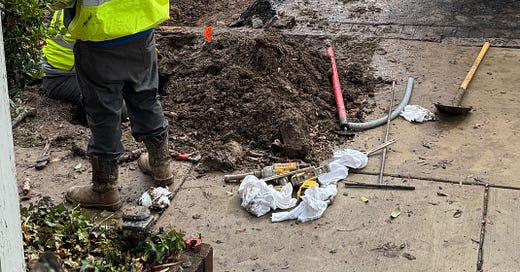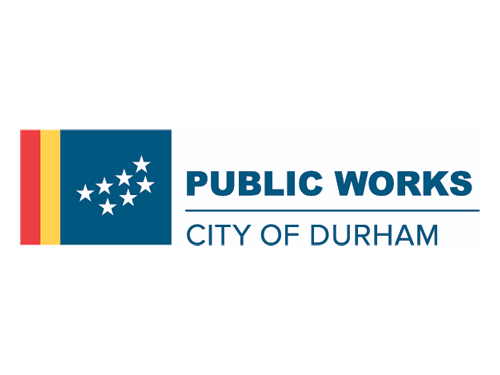In Praise of Public Works
Cities function best when they keep work simple and expedient.
Last Thursday sucked.
“Hey, the water pressure is extremely low.” That’s the text I got from the 7-month pregnant couple staying in my apartment garage.
It was 7 am, and I had a backlog of work and two important client meetings I had drawings to prepare for.
And no running water.
That’s when the franticness started. At this point, I presumed that this was not going to be a good day.
As a general contractor, I know what to look for. With no water in the crawl space and no apparent leaks around the foundation, I found the water meter in front of the house flooded out.
The bad news was that I had identified the leak. The good news was that this was most likely a city issue.
I was lucky to get through to city staff around 7:30 am, which was the first positive turn for the better. I had just assumed this would be 8 am minimum, if not 9, and then it would take a day or two to get through to a responsible party to start the repair process. Who knows how long it would take to schedule and mobilize site crews?
I had already mentally prepared for a long haul. In my land use advocacy and permitting world, there is no other type of haul.
On this 7:30 am call, professional support personnel from the City of Durham clarified that leaks on the city side of the meter were considered urgent and subject to their emergency response team. He said someone would likely be out within the hour.
Working with the city on a roughly weekly basis, this response seemed almost laughable. It takes 12-18 months to do a rezoning. It takes 6 months to get a sewer tap installed. “You'll be out before 9 am?” I thought. “like, today?” “With a heavy excavator and dump trucks?” Surely, this would not be the case.
Except it was.
A crew of five worked diligently to clear space for the repair (particularly difficult on an urban street with curb parking packed on school days). Yet, by 11 am, the utility trench was excavated. And by noon, service was restored.
The crew was professional, skilled, and expedient.
WHY CAN'T ALL GOVERNMENT WORK EXPEDIENTLY?
There’s definitely an engagement trap in progressive cities, which can be proven, via negativa, with my public works experience. What if, instead of fixing a major infrastructure problem in 3 hours, public works decided to treat my water line failure as a USDOT grant issue, requiring city-matching funding? And with the matching funding, it would need to be voted on. And if it needed to be voted on, then it needed to be subjected to public engagement. And if you start engagement, you need to engage with everyone, and here’s the list, etc.
In blue cities, we regularly make simple problems difficult. And we do not have to.
But I get it; some public priorities are more urgent, and some things genuinely take months, if not years, to design and build. But most things don’t. I offer an example.
I’ve been an active advocate for bicycle boulevards since 2011, when my children were 3 and 5 and could not bike safely around the city. Since then, I have, on dozens of occasions, suggested that a huge part of the problem could be fixed by simply adding flower planters to these corridors. They’re cheap, they’re flexible, they slow cars, and they demarcate bicycle priority. They should take a few hours to install.
With other advocates, we’ve provided budgets, drawn schematics, gathered quotes for support, and provided installation maps. Each time, the request goes into a black hole of politics, mismatched funding sources, engineering, planning, and engagement.
It’s just flower planters.
I’ve watched $10,000 in utility work get done in 180 minutes. But, in this example, I suspect I’ve witnessed 10 years and $500,000 of engineering and engagement debate on whether or not (and where) we should install a $200 planter. Just install them.
It’s just flower planters.
Why can’t simple things be done simply?
There’s a more significant lesson here on why the way we do public engagement is broken and ultimately unhelpful. In the case of the flower planters, engagement should succeed—not precede—simple installation. We could have had flower planters on the ground in 2015, which would have been lovely and placemaking and pride-inducing. The ones that didn’t work, for some reason (if there were any), would be subject to feedback and moved. That’s how cities should work.
FEEDBACK PLATFORMS BREED NEGATIVITY
A stand-up comedian once did a bit where he noted the ridiculousness of those 1-800 How’s My Driving bumper stickers that were ubiquitous on tractor-trailers in the 1990s. He said something to the effect of, “I’d call the number and be like, ‘Hey, did you have an 18-wheeler in Tucumcari on Wednesday? I just wanted to say that this guy did a 3-point turn that was beautiful. Absolutely magnificent stuff.”
The point is that no one uses feedback platforms for positive feedback. In this sense, public feedback systems are fatally flawed because they are inherently negative and non-representative. They should be labeled for what they are: complaint platforms.
Cities are easy to critique because they are massive, complex organisms with billion-dollar budgets, temporary leadership, and politicization of even the tiniest of issues. There’s no shortage of things that are not working in a city. I am not innocent of the critiques; I spend a lot of time deconstructing public planning and zoning. But the Public Works experience reminded me of two things:
City work is primarily a thankless job, and
These massive organisms do, sometimes, get things right
So I offer thanks where thanks is due. The Public Works crew leader was Kevin Horton. He ran a ship-shape job while representing the city. And I appreciate that.








I shared this post today with an OWASA director in Chapel Hill at an emergency job involving a busted water main, big machinery, no place to park, and a mature pine that had to be climbed and dismantled. All were humble and practical problem solvers, and this was a non-extraordinary Wednesday for them.
We need to have batting averages for government. Sometimes they do stuff well! Sometimes they don’t! Some kind of data-driven point system rather than the flawed complaint-driven feedback mechanism would help us to see what is working and not. If broken down by department it would be even better.